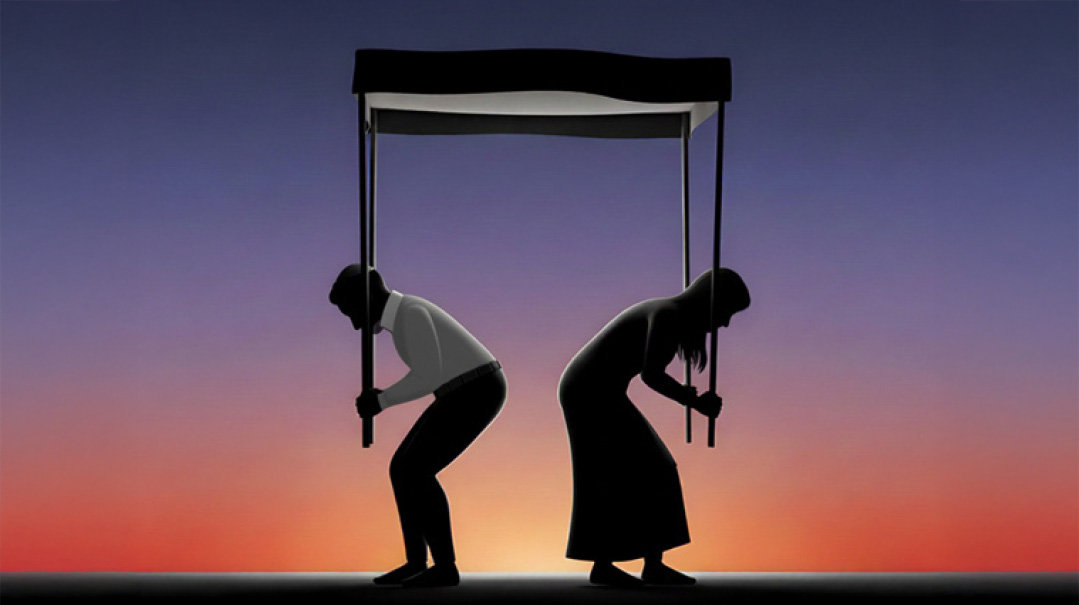As the Dust Settles

With a lethal raid on the Capitol bringing the Trump presidency to a shattering end, the dust is settling — and the questions abound

I don’t remember exactly when it happened, but at some point after candidate Trump became President Trump, a senior member of our staff sent me an email: What is our Trump policy? What is our approach to reporting on the president?
It was a good question and with time the question becomes more urgent.
As I see it, the crux of the issue was whether a human being’s personality can be untangled from their actions. For those who don’t agree with Trump on a policy level, there was never much conflict about the man. But among our readership, there was a growing, authentic gratitude for policies and actions that benefitted Jewish communities, Jewish individuals, and religious rights. A president who saw Iran as the danger it is. A president who stood up for Israel — and while some of our readers have no great love for the Jewish state, all pray for the security and safety of their brothers and sisters living there.
Did we notice that this same president had been embraced by followers on the far right? I think that most of us did. Some of us worried about that. Some dismissed it. And some tried to place it within a greater context. You can’t judge a leader entirely by his followers.
Did we notice his serious moral flaws? Of course we did. But our community has never looked to politicians as our role models or moral exemplars. Thankfully, we have our own internal sources for that. A vote for a politician is not a hechsher. It’s more like a business relationship: We support politicians — even unsavory politicians — who share our concerns, defend our values, and advance policies that are important to us.
Ask the typical Mishpacha reader and they will say that the greatest danger to their future in the US is the growing power of the progressive flank. They have watched with disquiet, then real worry, as radical leftists voiced antagonism toward religion, ignored or explained away violence against Jews, and promoted extreme theories that would rip down the foundations of America. Over months of “mostly peaceful” BLM protests that shattered storefronts, hard-won businesses, and people’s very sense of security, the worries grew only stronger. The promise of law and order seemed only more attractive against this wave of leftist activism that excused or glorified looting, threatened to defund or disband the police, and even created a zone “above the law.” Jews can’t afford to live in a country like that. We have too much painful experience.
These issues, among others, formed the basis for our community’s widespread support of President Trump — which grew warmer and stronger as he continued to deliver on his promises. Our magazine’s loosely formed “Trump policy,” which was never set in stone and never relayed as an official rule, fell roughly along these lines: Our news writers should avoid any undertones of celebrity or hero worship, and focus instead on facts and policy — and, in fact, much of those were positive for Jews, for Israel, and for religious rights. And our opinion writers could and should share their honest opinions, even if they were negative — because there certainly were negative takes to be shared.
I don’t know exactly when we began to notice it, but I can still pull out some emails where we began having discussions about a newer development. As one email put it,
I’ve been getting the feeling lately that among frum Jews, there are two types of Trump supporters. There are those who support him largely because they feel he is a bulwark against the progressive agenda, which is a dangerous one for religious practice, for the general morality of America, for their financial futures, and also for Israel. These people don’t adulate him personally and are honest about his failings. They probably find it ironic that such a G-dless and morally deficient person is their great hope against the anti-religious progressive wave.
And then there are those who have bought in to the personality cult. These people can see no wrong in Trump, they see him as a personal hero, they give him credit for anything good in the US and refuse to see his role in any problematic developments including the empowerment of the radical Right. This second group has lost the traditional Jewish approach toward politicians and people in power.
Every publication has a certain “typical reader” or spectrum of typical readers in mind as they build their product. Here, we had isolated two types (along with a portion of readers whom we knew to be Biden supporters). We hoped that the first group — the policy-driven supporters — would hear a ring of authenticity in our coverage. But at a certain point we realized that we wouldn’t be able to stick to our convictions and simultaneously satisfy the second group. So we told ourselves this: If the second group thought we weren’t pro-Trump enough, or that we didn’t paint Biden as satanic enough, then too bad. That wasn’t a sentiment we felt we had to honor.
When Trump was doing good things for the Jews and advancing conservative values, we aimed to produce material that pointed out the positive without taking on the tone of the saddening and maddening hero worship we were seeing elsewhere. And when his behavior or attitude or leadership was in fact lacking or destructive, we pointed that out too — knowing it could alienate some of the very people most closely identified with Mishpacha’s mission.
We paid for that decision — not only with angry letters but also with canceled subscriptions. Some readers said we displayed ingratitude toward a wonderful administration. Some accused us of covering up massive election fraud. At least one reader made a strange leap of logic — “you called Biden the president-elect so that means you clearly support the radical progressive agenda.” And while we don’t know the precise reason, one of our writers was pointedly ignored when he tried to ask a question during a conference call with an adviser of the president.
But we also heard from people who noticed and appreciated the balance we tried to achieve: to salute the good, acknowledge the troubling, and avoid the cult worship of a very flawed person.
Now, with a lethal raid on the Capitol bringing the Trump presidency to a shattering end, the dust is settling — and the questions abound.
In many ways, these four years were some of the most wrenching for our editorial and news teams. There were so many priorities, and they were all important: Reflecting the genuine hakaras hatov of our readers for an administration that advanced so many causes dear to believing Jews. Maintaining journalistic standards. Avoiding caricatured portrayals or sensationalism, pursuing nuance and depth. Allowing our individual contributors, who have very different views, to share their takes in their own authentic voices. And most of all, staying true to the guidance we got from daas Torah.
In internal discussions, in long and draining meetings, in conversations with writers and dialogue with readers, we kept hashing out the issues and mapping out our position.
Did we get it right? Hindsight is 20/20, and it’s always easy to blame and shame after the fact, but I think that most people make the best decisions they can with the knowledge, tools, and understanding currently available to them.
As religious Jews, we are aware of the precariousness of our situation in an increasingly polarized America; we sense the winds shifting toward an anti-religious and intolerant left even as a fiercely open anger sweeps through the right. We know there are extremists on both sides and that the extremes are never safe spaces for religious practice. We’ve learned that it’s never wise to fully embrace or wholly alienate either side of the power equation.
Four years ago, we never dreamed of this kind of conclusion to the Trump administration. But our decision early on not to cross the line to hero worship helped us keep our footing. In a sense, that was the challenge for the many religious Jews who feared the swelling of the left more than the fringes of the right: to be honest about the failings of the man who’d been entrusted with the reins, and to reserve their true faith for the One Who really holds them no matter who’s president. I don’t know if we all passed that test, but I’d like to hope that is what we aimed for — as individuals, as a community, and as a magazine.
—Shoshana Friedman, Managing Editor
(Originally featured in Mishpacha, Issue 845)
Oops! We could not locate your form.













